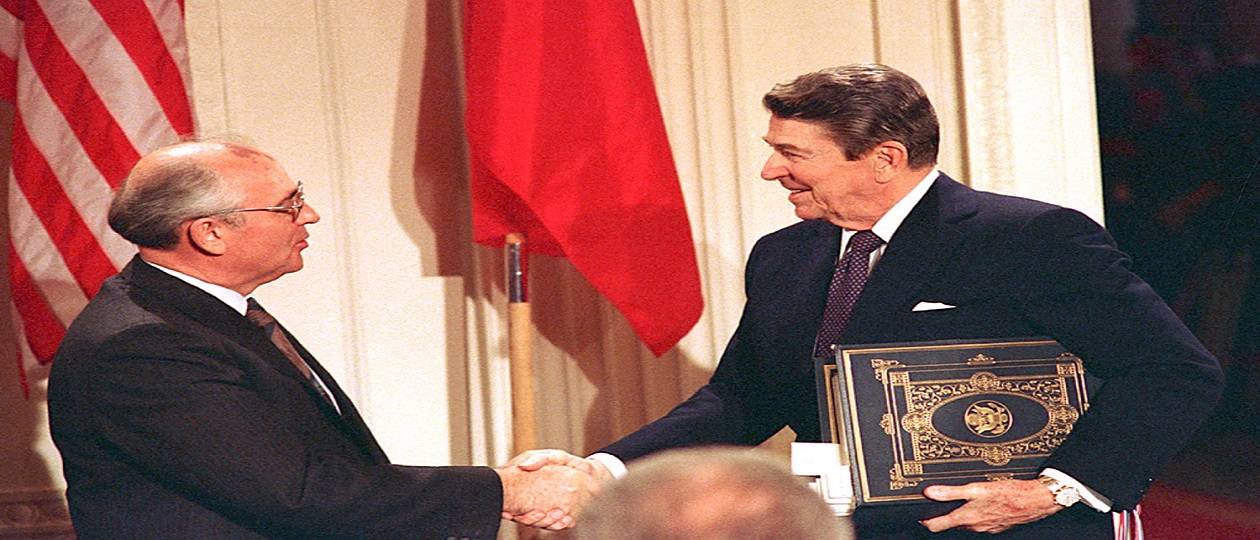
In December 1987, Mikhail Gorbachev and Ronald Reagan held their 3rd summit meeting in Washington and I covered this event in a group of Soviet reporters.
While there, I got a call from CNN. They invited me to take part once again in Crossfire nightly TV program. (I was their regular guest during my stay in US capital as Izvestia’s bureau chief from 1981 till 1986).
Crossfire used to be anchored by two panelists, one of whom was presented as being “on the left” and the other “on the right,” providing two sides of the US political spectrum. They subjected their guest, seated in between them, to a real crossfire of remarks and questions. This time, however, I was confronted by three, rather than the standard two, opponents.
The newcomer was Bernard Kalb, a veteran of American journalism who traveled the globe for more than three decades covering international affairs for CBS News, NBC News, and The New York Times. In 1984, he was appointed Assistant Secretary of State for Public Affairs and spokesman for the US State Department.
Two years later he quit this post to protest what he called “the reported disinformation program” conducted by the Reagan Administration against the Libyan leader Col. Muammar al-Gaddafi.
In Crossfire program with my participation on December 8, 1987 Kalb was joined by a couple who had started this program five years earlier. One of them was Tom Braden, a veteran of US intelligence services since WWII and a former personal assistant to Allen Dulles, director of CIA. In 1954 he left that agency and became a prominent political commentator of moderate views on radio and TV.
In 1982, Braden launched the Crossfire program together with Pat Buchanan, former special consultant and speech writer to US presidents Richard Nixon and Gerald Ford. Nixon used to call Buchanan the most brilliant and influential journalist of right-wing views.
An admirer of Joseph McCarthy, generals Robert E. Lee and Douglas MacArthur, he became a paleoconservative author and political commentator. Since 1982, Buchanan defended Nazi war criminal John Demjanjuk, nicknamed “Ivan the Terrible” as he was responsible for the mass murder of Jews at Treblinka extermination camp. After WWII Demjanjuk became a US citizen and settled down in Cleveland.
In 1986, while he was a senior figure in the Reagan administration, Buchanan was highly critical of the charges brought by the Office of Special Investigations (OSI), Nazi war crimes unit of the US Justice Department. He claimed Demjanjuk was the victim of a deliberate frame-up by the USSR. Also, he attempted to stop the deportation of another Nazi war criminal, Estonian Karl Linnas. In his TV debates with OSI officials, Buchanan behaved in his typical, highly aggressive and belligerent manner, mincing no words.
After Reagan’s reelection in 1984, Buchanan joined his team as Assistant to the President and White House Communications Director in hopes that the 40th US President would be able to disrupt the Evil Empire, as Buchanan, imitating his new boss, called the USSR. His obsession with this task was so immense that he agreed to a $72,000 per year salary which was nearly 6 times less than his previous annual income.
By the time of my TV debate with him, though, Buchanan had left the above mentioned post, returning to journalism as a nationally syndicated columnist and Crossfire panelist in order to fill in, as he put it, “the greatest vacuum in American politics to the right of Ronald Reagan”. In his letter of resignation Buchanan praised Reagan’s “decisions to send the Rangers and Marines to rescue Grenada for the Free World and to provide the patriots of Afghanistan, Angola and Nicaragua with the arms to recapture their countries from the quislings who betrayed them to the Soviet Empire”. Reagan responded by expressing sincere regret and thanking Buchanan “from the bottom of my heart for all you have done for me and my Administration”.
The topic of the Crossfire program with my participation was designated as “Propaganda War”, a reflection of “Gorbymania” that gripped the American public to such an extent that the popularity of the Soviet leader in US public opinion polls equaled Reagan’s.
They seated me in between Tom Braden and Bernard Kalb while Pat Buchanan took the extreme right position on TV screen and set the tone for the entire program:
— Has the American press gone into the tank for Mikhail Gorbachev? Again today demonstrators and dissidents were being beaten up in the streets of Moscow; 100,000 Soviet troops are still battling Afghan rebels and slaughtering Afghan tribesmen eight years after the original invasion, and Russian weapons are pouring into Nicaragua on our own continent at record rates; yet Mikhail Gorbachev who has presided over all of this for almost three years enjoys a higher approval rating in the United States than Ronald Reagan. Have the watchdogs of the American press suddenly become the lapdogs of the Soviet Empire?
Braden and Kalb complained about the naivety of the American press, too, and Buchanan turned to me:
— Your worst PR problem is the fact that you won’t let the Jews go. Even Czar Nicholas, Nicholas the Flogger he was called, let the Jews go. What exactly is the problem?
Ten years of living in and reporting from North America gave me enough knowledge of local propaganda and I responded:
— Let me make a few comments on what you said before. The weapons that are flowing into Nicaragua are American weapons supporting the anti-Government forces.
Buchanan didn’t like it:
— You’ve got two billion dollars worth of military equipment — putting it into Nicaragua, right on the backyard of the United States. Do you deny that?
— We are talking about the legitimate government elected by the Nicaraguan people. And the United States is supporting local rebels, as was shown earlier today when an American pilot was shot down over Nicaragua. What was he doing there?
Buchanan tried one more trick: “All right, we are talking glasnost,”, but I did not let him go:
— Another example is Afghanistan. American weapons are flowing into that country at a record level, too, and are used to battle its legitimate government. I think the American public would be interested to know that the rebels are trying to dismantle the progressive reforms carried out by the Afghan government with Soviet support.
BUCHANAN: Legitimate government of Afghanistan came in there on top of a T-72 tank? Why would you want to get out of what your own man, Gorbachev, calls a bleeding wound?
PALLADIN: The only reason why Soviet troops are still there is that the United States does not want to cut off its illegal aid to the rebels.
Buchanan continued to press:
— Tell me about the Jews. Why not let them go? Americans have a bumper sticker about their own country, “Love it or leave it.” Why won’t you tell the Jewish community, “You don’t like it here, why won’t you all leave?”
PALLADIN: Why don’t you care about your black community?
BUCHANAN: The black guy in the United States has a higher per capita income that the Russian.
PALLADIN: We don’t kill Jews. And I remember well what happened in Philadelphia back in ’85 when the MOVE black people were bombed.
Buchanan chuckled, copied by Braden:
— You’ve got to be kidding! The local authorities fouled up an operation
against MOVE.
PALLADIN: I think it’s inappropriate to laugh about the death of 11 people, including women and children.
It was Braden’s turn now:
— We are laughing at the equation you are trying to make… Look, Mr.Kalb, shouldn’t the American people understand that there is a moral difference between the Soviet Union and the United States? Aren’t we likely to lose that difference in the pop hero making of Mr.Gorbachev?
The former State Department spokesman agreed:
— Absolutely! There is certainly the risk of that. I think one should be on guard. We have seen some sort of a personality blitz on the part of Gorbachev descend on the United States. Let’s talk in terms of freedom for Jews who want to leave. Let’s talk about Soviet troops in Eastern Europe. Let’s talk about political prisoners, etc. We cannot be ambushed and seduced by the glitter of personality.
And the three of them continued to press the Soviet Jews emigration issue which prompted me to remark:
— In the USSR we do not paint synagogues with swastikas which happens in the United States.
Buchanan brushed it off:
— We don’t here — vandals do.
“There are hundreds of cases of vandalism against Jews here in the United States,” I remarked which drove Buchanan crazy:
— This fellow from Izvestia is not a journalist. He speaks on the party line as a Soviet journalist and of course Gorbachev speaks the party line. Our President speaks the American position and American journalists adopt the posture of neutrality as between their own government and the propaganda coming out of the other side.
After the commercial break, my opponents renewed “The Reds Can’t Be Trusted” tune, with Buchanan setting the tone and suggesting that the USA has the moral right to dictate its laws and rules to everyone else. Firing off his tirades like a machine-gun, he did not let me finish one single remark.
Next morning The New York Times commented, “We had a sense of real passion. Mr. Buchanan was on the verge of saying, throw the bum out of the studio.”
Five years later, Pat Buchanan ran for US president as a Republican but failed. He tried again in 1996 and 2000 with the same result.





